|
|
|
Sort Order |
|
|
|
Items / Page
|
|
|
|
|
|
|
| Srl | Item |
| 1 |
ID:
163231
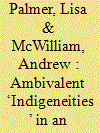

|
|
|
|
|
| Summary/Abstract |
Successfully achieving nationhood under the banner of what Anderson (2003) terms ‘aggregated nativeness’, Timor‐Leste is southeast Asia's newest nation. Yet as Anderson asserts ‘for the culture of nationalism … survival cannot be enough’ (2003: 184) and as with all other nationalisms, Timor‐Leste's nation‐making agenda is now engaged in the search for inclusive futures for its citizens. In this paper, we examine the extent to which Timor‐Leste's independence trajectory has included the active involvement of Indigenous Timorese traditions, practices and priorities in the governance of the new nation. By theorising these shifting ‘Indigenous’ ontologies and examining the ways in which they correspond (or not) with the tensions evident in more internationalised approaches to Indigeneity, we illuminate the socio‐political challenge of carving out spaces for plural identities and meaningfully diverse economic futures in Timor‐Leste. We argue that the term ‘Indigenous’ is not (yet) a term mobilised as a vehicle for the politics of recognition at either national or local levels of civil society.
|
|
|
|
|
|
|
|
|
|
|
|
|
|
|
|
| 2 |
ID:
092970
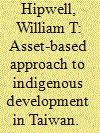

|
|
|
|
|
| Publication |
2009.
|
| Summary/Abstract |
Numerous scholars studying community efforts to (re-)establish autonomy have begun to focus on the importance of empowerment in the economic, political and cultural spheres. There is a growing understanding that such empowerment can be hastened by affirmative development strategies that build on community assets and capacities rather than attempting to redress - and thereby emphasising - needs or lack. Such development work reflects intertwined currents in contemporary philosophy, influenced by the thought of Friedrich Nietzsche and of Gilles Deleuze. In Taiwan, a recent resurgence in identities among marginalised aboriginal or indigenous peoples ('Formosans') has been accompanied by novel approaches to development. This discussion heuristically employs a set of development theories that are essentially variants of 'asset-based community development' (ABCD) to suggest that a focus on affirmation and empowerment has been and can be a key to success in Formosan development initiatives. The paper presents the results of qualitative field research, illuminating three case studies of Formosan development - in Tsou, Tayal and Taroko territories. It argues that Formosan development will benefit from a focus on community capacity, political empowerment and social as well as physical assets, and that to an important degree this has already happened in some communities.
|
|
|
|
|
|
|
|
|
|
|
|
|
|
|
|
| 3 |
ID:
124424


|
|
|
|
|
| Publication |
2013.
|
| Summary/Abstract |
Indigenous peoples are often perceived as custodians of nature owing to their close relationship with their environment and their nature-based livelihoods. This paper investigates the kinds of environmental agencies that are constructed for, and by, indigenous peoples within the United Nations (UN) Permanent Forum on Indigenous Issues (PF) and the Arctic Council. The particular focus of this research is the issue of responsibility. The article brings together empirical materials from the two forums and engages with them using Foucault-inspired approaches. We offer a critical discussion of indigenous peoples' environmental agency in international politics, addressing the need to problematize representations of indigenous agency that to date have been largely unchallenged in both the practice and study of international politics. We identify three perspectives through which the environmental agency of indigenous peoples is validated and justified: having particular knowledge, being stakeholders, and having a close relationship with nature. Certain kinds of expectations are inscribed in each of these perspectives; responsibility becomes intertwined with agency.
|
|
|
|
|
|
|
|
|
|
|
|
|
|
|
|
| 4 |
ID:
153601
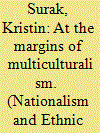

|
|
|
|
|
| Summary/Abstract |
Will Kymlicka's theories of multiculturalism have gained wide interest in the West but only recently have been applied beyond it. This research note assesses whether a Kymlickian approach provides traction for grasping the configuration of nondominant ethnic groupings in Japan and how they have achieved a degree of multicultural recognition. It first identifies equivalents and exceptions within the Japanese case to Kymlicka's key groupings: national minorities, indigenous peoples, immigrants, and metics. It then shows that of these, the last two drove the expansion of multicultural rights. Finally, it examines why they launched claims within a multicultural framework and assess the limits of the multicultural claims for bolstering the rights of subordinate groups.
|
|
|
|
|
|
|
|
|
|
|
|
|
|
|
|
| 5 |
ID:
165105
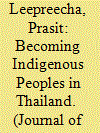

|
|
|
|
|
| Summary/Abstract |
This article investigates the processes of becoming Indigenous Peoples in Thailand by tracing the transnational relationships and influences of global Indigenous movements on the creation of the Network and the Council of Indigenous Peoples in Thailand (NIPT and CIPT). In addition, it examines the Indigenous Peoples’ movement toward both internal and external recognition. I argue that in Thailand the Indigenous Peoples movement stems from the global movement and exists in relation to international organisations. Within Thailand, the movement represents a deterritorialisation of the ethnoscape, with those now identified as Indigenous Peoples previously being identified as ‘tribal peoples’, ‘ethnic minorities’, or ‘Others’ who threatened national security. Indigenous Peoples are also self-identifying as native and marginalised peoples whose basic rights must be recognised and who advocate for equal treatment as citizens. Yet, the Indigenous Peoples’ movement in Thailand is developing through a process of ongoing negotiations with various internal and external sectors. As a Hmong anthropologist and long-time participant in the Indigenous movement in Thailand, in addition to secondary sources, I draw mainly on personal observations and interviews with key informants.
|
|
|
|
|
|
|
|
|
|
|
|
|
|
|
|
| 6 |
ID:
160804
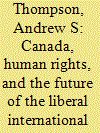

|
|
|
|
|
| Summary/Abstract |
Human rights—specifically international human rights law—have been central to the success of the liberal international order. But since the founding of the United Nations (UN), Canada has had a complicated relationship with international human rights law. This article provides a survey of sixty years of Canadian human rights diplomacy at the UN Commission on Human Rights, from its establishment in 1946 to its dissolution in 2006. During this period, there were moments when Canada did champion new international law, and did so courageously. Yet there were others, such as during negotiations to recognize and codify the rights of Indigenous peoples, when it stood in the way of progress. But the international order that has served Canada so well since the end of the Second World War is under threat, due to a combination of shifts in the global balance of power, and critical challenges such as climate change. If it is to survive into the twenty-first century, advanced democracies such as Canada will need to lead in the development and enforcement of international human rights law, a role that governments in Ottawa have at various times been reluctant to play.
|
|
|
|
|
|
|
|
|
|
|
|
|
|
|
|
| 7 |
ID:
169209
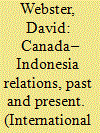

|
|
|
|
|
| Summary/Abstract |
Canada–Indonesia relations recently passed their 65th anniversary, but they still have a tentative air about them. Despite regular talk about developing a strong Canadian relationship with a country that potentially has much in common with Canada, Canada–Indonesia relations have mostly been friendly but shallow. An overview of the history of bilateral relations, from the opening of a Canadian mission in 1953 to recent bilateral deals committing Ottawa and Jakarta to various forms of collaboration, reveals that rhetoric about common interests has some substance, but a new announcement amidst good intentions every few years is not likely to lead to any deep partnership. There are, however, foundations for closer ties in civil society, including in the fields of economic development, truth and reconciliation, religious deradicalization, and Indigenous peoples linkages.
|
|
|
|
|
|
|
|
|
|
|
|
|
|
|
|
| 8 |
ID:
101762
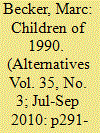

|
|
|
|
|
| Publication |
2010.
|
| Summary/Abstract |
In June 1990, the Confederation of Indigenous Nationalities of Ecuador (CONAIE) led a massive uprising against their social, economic, and political marginalization. The protest altered the political landscape of Ecuador and gave that country a reputation as home to some of the strongest and best-organized social movements in South America. Two decades later-this year, 2010-the children of the leaders of that historic uprising continued to lead mobilizations against the government. This time, however, Rafael Correa, whom many saw as emblematic of Latin America's shift to the left, was in power. What explains indigenous protest against a leftist government? Was Correa not a true leftist, as some militants alleged? Or was this yet another example of a white urban left failing to take the concerns of rural indigenous communities into account? Recent developments point to an alternative explanation: Indigenous movements have become more conservative and have discarded a strategy of building coalitions that had brought them so much success in the twentieth century.
|
|
|
|
|
|
|
|
|
|
|
|
|
|
|
|
| 9 |
ID:
185625
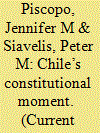

|
|
|
|
|
| Summary/Abstract |
In an October 2020 referendum, nearly 80 percent of Chileans voted to start a process to write a new constitution. A special assembly with equal representation of men and women will now attempt to replace the 1980 dictatorship-era constitution. Getting to this point was a major win for workers, students, leftists, feminists, Indigenous peoples, and the poor, all of whom were involved in leading 2019’s widespread protests over social and economic inequality. The demonstrations forced the conservative government to make the concession of holding the referendum. Chile now embarks on the fraught process of writing a new constitution that must satisfy diverse stakeholders while reforming political and economic systems that have preserved the legacy of the Pinochet dictatorship.
|
|
|
|
|
|
|
|
|
|
|
|
|
|
|
|
| 10 |
ID:
142716
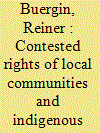

|
|
|
|
|
| Summary/Abstract |
The conceptualization of interrelations between biological and cultural diversity since the 1980s indicates a biocultural turn in discourses and policies regarding nature conservation, sustainable development, and indigenous peoples. These interrelations frequently manifest as conflicts between local communities who derive their livelihoods and identity from their lands and resources, and external actors and institutions who claim control over these areas, invoking superior interests in nature conservation, development, and modernization. In these asymmetric conflicts over biocultural diversity, framed in discourses that demand the preservation of both biological and cultural diversity, the opportunities for local communities to assert their claims crucially depend on external discursive and legal frameworks.
|
|
|
|
|
|
|
|
|
|
|
|
|
|
|
|
| 11 |
ID:
174556
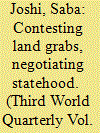

|
|
|
|
|
| Summary/Abstract |
In Cambodia, rural citizens embroiled in protracted land grabbing cases with the state and private companies are turning increasingly to international accountability mechanisms for resolution. This article applies the interlinked concepts of hybrid governance and legal pluralism to understand the prospects and limitations of ‘forum-shopping’ through appeals to international mechanisms for rural communities affected by land grabs. Drawing on interviews and using process tracing, it examines the outcomes of a mediation case filed with the International Finance Corporation’s Compliance Advisor/Ombudsman (CAO) involving indigenous groups and a Vietnamese rubber company in north-east Cambodia. It argues that while international accountability mechanisms yield platforms for dispossessed groups to assert claims, they also reify choices between entitlements and attainability without circumventing the problems associated with justice delivery under Cambodia’s authoritarian regime. Overall, this study highlights the interaction, competition and collaboration between distinct forms of regulatory authority exercised by national and transnational actors involved in land grabbing cases in Cambodia, demonstrating their role in ‘negotiating statehood’ by governing local claims to land.
|
|
|
|
|
|
|
|
|
|
|
|
|
|
|
|
| 12 |
ID:
143571
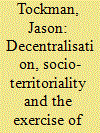

|
|
|
|
|
| Summary/Abstract |
This article analyses the ‘indigenous autonomy’ being constructed in two dozen Bolivian municipalities and territories, in accordance with the 2009 Constitution. It finds that Bolivia’s 1994 decentralisation reforms, which created the country’s system of municipalities, are central to understanding the contemporary implementation of indigenous autonomy. Some indigenous people view as favourable the representative and material gains achieved by municipalisation, which helps explain why more majority-indigenous communities have not yet chosen the new option of indigenous autonomy. However, the new legal framework also limits indigenous self-governance, because territorial delimitations of the country’s municipalities are generally inconsistent with indigenous peoples’ ancestral territories. The new institutions of self-governance are legally obligated to include discrete legislative, executive and administrative functions, reflecting not indigenous norms but a municipal structure of liberal design. This study illustrates the way that indigenous self-determination may encounter obstacles where indigenous territorial jurisdictions must coincide with contemporary boundaries of colonial origins, rather than with pre-colonial territories.
|
|
|
|
|
|
|
|
|
|
|
|
|
|
|
|
| 13 |
ID:
102682
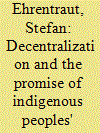

|
|
|
|
|
| Publication |
2011.
|
| Summary/Abstract |
Indigenous peoples' rights, including the right to self-determination, are increasingly codified in international law and policy and disseminated globally by international organizations. These norms mark a profound change in the ideals of citizenship promoted by the international community, away from linguistically and institutionally homogenous citizenship in centralized states to group-differentiated citizenship in decentralized, multi-level and multi-lingual states that use local and regional autonomy for the accommodation of indigenous peoples. Essential to realizing these norms is the devolution of some degree of autonomy to sub-central state units substantially controlled by indigenous communities. Because the transfer of powers to indigenous peoples is crucial to their accommodation, protection and participation in modern states, and because decentralization programs are an important component of reform agendas in most developing countries, it is important to understand how these emerging norms are integrated into real-world decentralization processes.
This article analyzes the application of the World Bank's safeguards policy for indigenous peoples within the institution's support to decentralization reform in Cambodia. The analysis demonstrates that under certain circumstances, the policy not only fails to translate into effective protection but leads to outcomes diametrically opposed to its objectives. In its current design, Bank support to decentralization contributes to the marginalization of indigenous peoples in Cambodia and undermines the institutional, cultural and natural resources upon which their empowerment and participation depends. In environments in which full compliance might be unrealistic to accomplish by individual projects, safeguard obligations lead to a strategy on the part of Bank projects of avoiding geographical and policy areas that are likely to trigger the safeguards policy, in order to reduce projects' vulnerability to non-compliance claims. The article discusses how more effective application of the safeguards policy might be achieved and how strategies for the empowerment of indigenous peoples can more effectively draw on decentralization frameworks.
|
|
|
|
|
|
|
|
|
|
|
|
|
|
|
|
| 14 |
ID:
178792
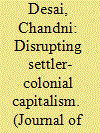

|
|
|
|
|
| Summary/Abstract |
This article explores the resurgence of Indigenous/Palestine solidarity during the Wet’suwet’en land sovereignty struggle in Canada that took place around the same time Donald Trump’s Middle East “peace plan” was released in early 2020. Historicizing this resurgence within a longer period of anti-colonial resistance, the article attends to the distinct historical, political-economic, and juridical formations that undergird settler colonialism in Canada and Israel/Palestine. It contends with the theoretical limits of the settler-colonial framework, pushing back against narratives of settler success, and shows how anti-colonial resistance accelerated economic crises that led both settler states to enter into “negotiations” with the colonized (reconciliation in one case, and peace talks in the other) as a strategy to maintain capitalist settler control over stolen lands. The analysis also sheds light on a praxis of solidarity that has implications for movement building and joint struggle.
|
|
|
|
|
|
|
|
|
|
|
|
|
|
|
|
| 15 |
ID:
152498


|
|
|
|
|
| Summary/Abstract |
Comparative analyses have found that non-self-governing islands tend to have much better development indicators than sovereign islands. Perhaps unsurprisingly, since 1983 no non-self-governing island has acquired political independence. This paper argues that rather than merely maintaining the status quo with their colonial metropoles, non-self-governing islands are actively creating a new form of sovereignty. This creation of an “Islandian” sovereignty takes place against the backdrop of debates on the relevance of classic Westphalian sovereignty and emerging practices of Indigenous sovereignty. This paper reviews global research on the sovereignty of islands and from this review, develops an analytical framework of five mechanisms that drive the emerging Islandian sovereignty. This framework is tested and illustrated with a case study of the negotiations about sovereignty between New Caledonia and its colonial metropole, France.
|
|
|
|
|
|
|
|
|
|
|
|
|
|
|
|
| 16 |
ID:
144258
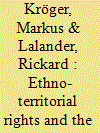

|
|
|
|
|
| Summary/Abstract |
In recent times a growing number of Latin American rural groups have achieved extended ethno-territorial rights, and large territories have been protected by progressive constitutions. These were the outcomes of extended cycles of national and transnational contentious politics and of social movement struggle, including collective South–South cooperation. However, the continent has simultaneously experienced a resource extraction boom. Frequently the extractivism takes place in protected areas and/or Indigenous territories. Consequently economic interests collide with the protection and recognition of constitutional rights. Through a review of selected demonstrative cases across Latin America, this article analyses the (de jure) rights on paper versus the (de facto) rights in practice.
|
|
|
|
|
|
|
|
|
|
|
|
|
|
|
|
| 17 |
ID:
181171


|
|
|
|
|
| Summary/Abstract |
The Arctic is on fire. Warmed by the world’s soaring greenhouse gases, its ice cap is melting, and it is heating twice as fast as the rest of the planet, deepening the earth’s climate crisis. As its ice thaws, buried resources, trade routes, and new tourist opportunities are suddenly accessible. The borders of the earth’s two largest nuclear rivals, the US and Russia are less than 3 miles apart in the Arctic region and their hostility is growing. Seeking new trade routes and investment opportunities and rapidly rising above its rank as the earth’s third most powerful country, China, has declared itself a ‘near Arctic state’ and is exercising a voice in Arctic affairs. Russia and Arctic NATO members have expanded their military presence in the far North. Despite potential tensions and rapidly melting ice, there is no effective overarching governing regime in the region that can mitigate the climate crisis or manage conflicts were they to arise. Nonetheless, the Arctic remains free of interstate violence. The explanation for the absence of violent conflict cannot be found in traditional International Relations (IR) Theories. Looking below the radar of IR theory and expanding the Human Heritage approach, I show that the region contains a web of overlapping local, regional, national, and pan-Arctic institutions and agreements, built on both traditional and Western knowledge and often steered by indigenous knowledge holders in Arctic governance. This informal web of governing regimes manages Arctic resources to protect human heritage and guard human security. In doing so, it creates a cooperative environment which guides dispute settlement among Arctic states. It is the power of these networks, their normative commitments, and the knowledge that informs them that help to explain the absence of violent interstate conflict in the region.
|
|
|
|
|
|
|
|
|
|
|
|
|
|
|
|
| 18 |
ID:
184239
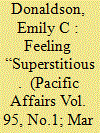

|
|
|
|
|
| Summary/Abstract |
For many Indigenous peoples, ancestral lands are a source of nourishment, strength, and sovereignty that counteracts colonial legacies of violence and hegemony. However, the feelings associated with place and the land can also be complicated by embodied fear and ambivalence. What happens when the remnants of colonialism feed feelings of ambivalence, shame, or fear of the land? How do these lasting emotional scars on Indigenous minds and bodies impact Native place making, today? This paper problematizes the role of ancestral lands and affective place making in shaping Indigenous identity, sovereignty, resource management, and sustainability. In the Marquesas Islands of French Polynesia, ancestral places are felt as much as seen, and the spirits that dwell there can be dangerous. The active concealment of these Marquesan reactions and relationships to place illustrates the blending of colonial and Indigenous histories and values in ambivalent, affective experiences on the land. Thus, even as islanders work to revitalize their traditional culture and build a sustainable future based on ancestral places, reticence complicates local relationships to the land and the vital hopes they represent. As global sustainability efforts emphasize the conservation of lands inhabited by Indigenous communities, recognizing the conflicted, emplaced emotions and experiences of local peoples will be a key part of understanding such areas and how to preserve them.
|
|
|
|
|
|
|
|
|
|
|
|
|
|
|
|
| 19 |
ID:
129199


|
|
|
|
|
| Publication |
2014.
|
| Summary/Abstract |
Imagine subsistence hunters in Brazil, or farmers in the Andean highlands, or fishing communities in Cambodia. Each of these geographically disparate groups is among the indigenous peoples of the world whose livelihoods, cultures, and identities are intimately tied to the land on which they have lived for generations. However, they do not only share this tie to their traditional land. Indigenous peoples' rights to their land, territories, and natural resources have often been historically ignored or neglected when large-scale development or conservation activities, such as hydropower dams or protected areas, were being planned and implemented.
Conservation and development activities have the potential to negatively or positively impact the rights of indigenous peoples, both at very small or very large scales. Notably, data from the Global Environment Facility (GEF) shows that land under the management of indigenous peoples only makes up 20% of the world's landmass and yet it holds roughly 80% of the Earth's remaining biodiversity. This biodiversity and related traditional knowledge, which has been maintained, used, catalogued, and respected for thousands of years by many indigenous peoples, has the potential to maintain cultures, help agricultural systems adapt to a changing climate, offer medical solutions, and inspire awe. However, anything this traditional knowledge may offer the rest of the world, including the biodiversity it has maintained, must be provided with the consent of the indigenous peoples to which it belongs.
|
|
|
|
|
|
|
|
|
|
|
|
|
|
|
|
| 20 |
ID:
165104
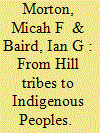

|
|
|
|
|
| Summary/Abstract |
This article presents a chronology of the growth of the concept of Indigeneity in Thailand, analysing the particular ways in which the global Indigenous movement has taken root in the country. In Thailand, transnational support networks and the opening of political associational space played key roles in facilitating the growth of, first, a regional, and later a national Indigenous movement during the 1980s and early 2000s, respectively. Indigenous Peoples in Thailand are asserting their identity by drawing on a new concept of Indigeneity being promoted by the United Nations and other international advocacy organisations that identifies them not only as first peoples, but crucially as colonised or oppressed peoples. Indigenous Peoples in Thailand are further asserting both their cultural distinctiveness and their compatibility with the Thai nation. The Indigenous movement in Thailand differs from movements in Australia, Canada, and the United States where Indigenous Peoples must perform their cultural distinctiveness to maintain political recognition, and in turn are accused of being not different enough when exercising their rights. In Thailand, rather, Indigenous Peoples are accused of being not Thai enough in their efforts to push for any political recognition. While the Thai government denies the relevance of the concept of Indigeneity to Thailand, it is clear that the Indigenous movement in Thailand has grown since the early 2000s. In fact, state policies between the 1950s and early 2000s contributed toward the scaling-up of a pan-Hill tribe identity among the core groups associated with the movement.
|
|
|
|
|
|
|
|
|
|
|
|
|
|
|
|
|
|
|
|
|